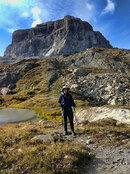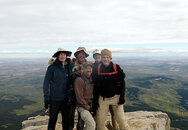It’s probably been 4 years since I’ve been diving and I am considering getting back in the water. I’m in my early 60’s and had only learned to dive about 10 years ago so have about 5 years of experience. (OW, AOW, Drysuit).
Two years ago I had a full left hip replacement that went well but when I took the required physical before the surgery, doctors detected some heart abnormalities. After wearing monitors and many tests it was suggested I was a good candidate for an ablation procedure to treat AFib and flutter. The ablation procedure went well and I was able to have my hip replacement.
I shouldn’t diagnose myself but wonder if some of the occasional anxiety I felt while diving the last half year I was active was due to AFib episodes and/or flutter. It was nothing I couldn’t manage but it took some of the enjoyment out of diving.
My doctors tell me my heart is great in all other areas and while I occasionally feel symptoms, it is very rare and mild, nothing to the degree before the procedure. I have been told I have no limitations in activities I can do. With Covid I have not been in to see them for some time and know I should at least call if not schedule an appointment.
I dive in Puget Sound, almost all beach dives, and am a Photographer and like to carry a full pro sized DSLR, double strobes, large ports and domes, steel tanks, drysuit, etc. so it can be a workout. I hiked/climbed Chief Mountain in Montana the previous summer so conditioning shouldn't be an issue.
I am not on any medication.
Thanks in advance for sharing similar experiences or thoughts.
Two years ago I had a full left hip replacement that went well but when I took the required physical before the surgery, doctors detected some heart abnormalities. After wearing monitors and many tests it was suggested I was a good candidate for an ablation procedure to treat AFib and flutter. The ablation procedure went well and I was able to have my hip replacement.
I shouldn’t diagnose myself but wonder if some of the occasional anxiety I felt while diving the last half year I was active was due to AFib episodes and/or flutter. It was nothing I couldn’t manage but it took some of the enjoyment out of diving.
My doctors tell me my heart is great in all other areas and while I occasionally feel symptoms, it is very rare and mild, nothing to the degree before the procedure. I have been told I have no limitations in activities I can do. With Covid I have not been in to see them for some time and know I should at least call if not schedule an appointment.
I dive in Puget Sound, almost all beach dives, and am a Photographer and like to carry a full pro sized DSLR, double strobes, large ports and domes, steel tanks, drysuit, etc. so it can be a workout. I hiked/climbed Chief Mountain in Montana the previous summer so conditioning shouldn't be an issue.
I am not on any medication.
Thanks in advance for sharing similar experiences or thoughts.






